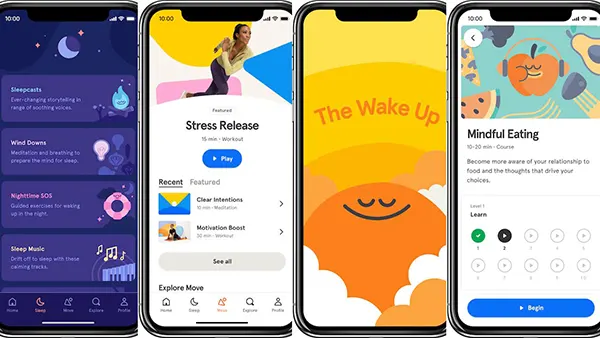Headspace: How Smartphone Meditation Reduces Stress and Improves Focus
In today’s demanding world, maintaining mental balance has become crucial for both personal well-being and productivity. Headspace is a well-known mobile app that helps people develop mindfulness skills through guided meditations, breathing exercises, and daily check-ins. By combining scientific research with practical techniques, it provides a simple yet effective way to reduce stress and strengthen concentration.
The Science Behind Meditation and Mental Health
Modern neuroscience has shown that mindfulness meditation can significantly lower stress levels and enhance emotional stability. Studies from institutions like Harvard Medical School and Stanford University reveal that regular meditation reduces cortisol, the hormone linked to stress, and strengthens neural connections in areas of the brain responsible for emotional regulation and focus. These findings form the foundation of Headspace’s content.
Headspace delivers this scientific knowledge through structured audio sessions that are short enough to fit into any schedule. These sessions are designed with input from clinical psychologists and mindfulness experts, ensuring their reliability and safety. This makes the app a practical entry point for anyone seeking stress relief without committing to lengthy training programmes.
Furthermore, regular mindfulness practice stimulates neuroplasticity, the brain’s ability to reorganise itself. This helps users respond more calmly to challenges, manage anxiety more effectively, and maintain a balanced mental state even under pressure. Over time, these benefits become more pronounced, supporting long-term psychological resilience.
How Headspace Incorporates Evidence-Based Methods
Headspace’s creators use peer-reviewed research to shape their mindfulness courses and exercises. Every meditation is designed with measurable outcomes, such as reducing anxiety symptoms, improving sleep quality, or enhancing focus. This evidence-based structure distinguishes the app from casual relaxation tools and ensures its value as a mental health resource.
The app frequently updates its content to reflect the latest scientific studies, keeping users aligned with modern practices. This commitment to accuracy increases trust among mental health professionals who often recommend the app as part of broader wellness strategies.
By presenting meditation as a practical skill supported by data, Headspace encourages users to treat mindfulness as part of everyday self-care, rather than an abstract or spiritual activity. This realistic framing helps remove stigma and promotes consistent use.
Building a Consistent Mindfulness Routine
One of the greatest challenges in practising meditation is staying consistent, and this is where Headspace stands out. The app provides progress tracking, gentle reminders, and goal-setting features that motivate users to keep returning. This regularity is essential because mindfulness works best when practised daily rather than occasionally.
Short daily sessions, often only 5–10 minutes long, allow users to incorporate mindfulness into lunch breaks, commutes, or morning routines. This accessibility helps busy individuals maintain mental health without disrupting their schedules, which is vital in fast-paced environments.
As these small daily practices accumulate, they build a strong habit that improves emotional regulation, concentration, and resilience to stress. This gradual, sustainable approach helps prevent burnout and supports mental clarity over the long term.
Motivational Features that Encourage Regular Practice
Headspace uses gamified elements like streaks and achievement badges to keep users motivated. These subtle incentives make daily meditation more engaging and help maintain momentum during challenging periods when motivation might naturally drop.
In addition, users can join themed courses, such as stress management or improving focus, which create a sense of progression and achievement. Completing these courses gives users a tangible sense of growth, reinforcing the habit.
The combination of personalisation, rewards, and educational structure transforms meditation from an abstract concept into a daily routine, increasing its long-term effectiveness in reducing anxiety and boosting concentration.

Practical Tools for Reducing Stress and Boosting Focus
Beyond traditional meditation sessions, Headspace offers specialised tools tailored for specific mental health needs. These include breathing exercises for quick stress relief, sleepcasts for improving rest, and focus music to enhance productivity. Each feature is designed to be simple, fast, and backed by behavioural science.
Quick calming exercises, for example, are ideal during stressful situations like exams, presentations, or high-pressure meetings. They work by slowing the heart rate and calming the nervous system, allowing users to regain control quickly without stepping away from responsibilities.
Meanwhile, the focus-enhancing sessions use scientifically composed audio to reduce distractions and support sustained attention. By integrating these tools into daily routines, users can manage stress proactively and maintain better focus throughout the day.
Making Mindfulness Accessible in Everyday Life
Headspace’s biggest strength lies in its accessibility. Its user-friendly design and short session lengths make it suitable for beginners and experienced practitioners alike. This inclusiveness helps normalise mindfulness as part of everyday life rather than a specialised activity.
The app also adapts to different lifestyles, offering offline access for travel, personalised recommendations based on usage, and diverse session formats for varied preferences. This flexibility ensures users can continue their practice wherever they are.
By lowering barriers to entry and aligning with users’ real-world needs, Headspace allows mindfulness to become a practical tool for managing stress and enhancing focus — supporting both personal well-being and professional performance.